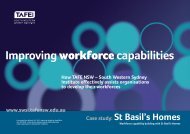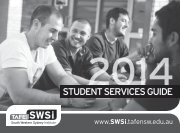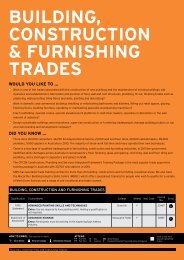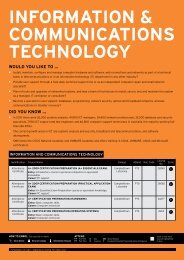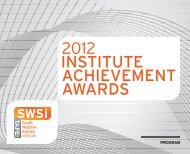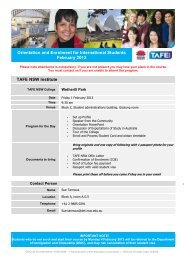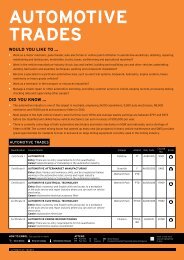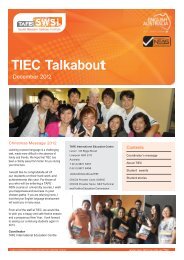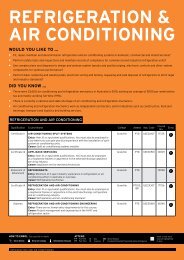Disability Services Australia - South Western Sydney Institute - TAFE ...
Disability Services Australia - South Western Sydney Institute - TAFE ...
Disability Services Australia - South Western Sydney Institute - TAFE ...
Create successful ePaper yourself
Turn your PDF publications into a flip-book with our unique Google optimized e-Paper software.
Improving workforce capabilities<br />
How <strong>TAFE</strong> NSW – <strong>South</strong> <strong>Western</strong> <strong>Sydney</strong><br />
<strong>Institute</strong> effectively assists organisations<br />
to develop their workforces<br />
www.swsi.tafensw.edu.au<br />
Case study from Mitchell, J.G. 2011, Improving Workforce Capabilities.<br />
How <strong>TAFE</strong> NSW - <strong>South</strong> <strong>Western</strong> <strong>Sydney</strong> <strong>Institute</strong> (SWSI) effectively<br />
assists organisations to develop their workforces.<br />
Case study: <strong>Disability</strong><br />
<strong>Services</strong> <strong>Australia</strong><br />
Workforce capability building with <strong>Disability</strong> <strong>Services</strong> <strong>Australia</strong> (DSA)
Foreword<br />
<strong>TAFE</strong> NSW - <strong>South</strong> <strong>Western</strong> <strong>Sydney</strong> <strong>Institute</strong> actively<br />
services the workforce development needs of a wide<br />
range of businesses and industries, ranging from<br />
some of <strong>Australia</strong>’s largest companies to medium and<br />
small enterprises and government departments.<br />
To profile the <strong>Institute</strong>’s capacity to deliver workforce<br />
development services, the <strong>Institute</strong> commissioned<br />
this case study.<br />
My thanks is extended to our industry partner<br />
that gave permission to reproduce their story.<br />
The case study achieves the multiple goals of:<br />
• demonstrating our capacity to provide<br />
programs that meet and frequently exceed<br />
client expectations<br />
• illustrating how we are working with<br />
organisations to support their workforce<br />
capability and capacity building<br />
• highlighting the skills of our <strong>Institute</strong> staff in<br />
designing, delivering and supporting programs<br />
for our clients<br />
• providing examples of collaboration between<br />
the <strong>Institute</strong>, our clients and other partner<br />
organisations.<br />
Importantly, the case study shows how the<br />
benefits of working with <strong>South</strong> <strong>Western</strong> <strong>Sydney</strong><br />
<strong>Institute</strong> have ensured sustainable outcomes for<br />
our clients as the <strong>Institute</strong> is:<br />
• committed to ongoing client partnerships and<br />
has the essential skills and resources to<br />
maintain that partnership<br />
• capable and willing to provide follow-up<br />
training and advice linked to ongoing<br />
monitoring and review.<br />
We welcome the opportunity to discuss how we<br />
can provide workforce development solutions to<br />
your business.<br />
Peter Roberts<br />
<strong>Institute</strong> Director<br />
<strong>TAFE</strong> NSW - <strong>South</strong> <strong>Western</strong> <strong>Sydney</strong> <strong>Institute</strong>
Case study: <strong>Disability</strong> <strong>Services</strong> <strong>Australia</strong><br />
Workforce capability building with <strong>Disability</strong> <strong>Services</strong> <strong>Australia</strong> (DSA)<br />
• client needs<br />
• challenge for <strong>Institute</strong><br />
• <strong>Institute</strong> responsiveness<br />
• client outcomes<br />
- <strong>Disability</strong> <strong>Services</strong><br />
<strong>Australia</strong> (DSA) is one of<br />
<strong>Australia</strong>’s most respected<br />
providers of employment<br />
and community support<br />
services for people with a<br />
disability. It needs to cope<br />
with substantial growth in<br />
demand for its services<br />
and thus for competent<br />
staff.<br />
- While DSA requires its staff to obtain a<br />
Certificate III as a minimum qualification, many<br />
staff have literacy or other challenges that need<br />
resolving before the staff can complete the<br />
qualification.<br />
- The staff are spread over an area from<br />
Queanbeyan near Canberra to Penrith in <strong>Sydney</strong><br />
and north to Port Stephens near Newcastle.<br />
- DSA provides 24-hour services and the <strong>Institute</strong><br />
has to fit in with that feature of DSA.<br />
- Three partners are involved: DSA, DSA’s own<br />
registered training organisation and the <strong>Institute</strong>.<br />
- To meet DSA’s needs, the <strong>Institute</strong><br />
had to adapt to new models of<br />
learning developed by DSA, including<br />
moving away from classroom theorybased<br />
teaching to self-paced online<br />
learning.<br />
- Rather than classroom-based<br />
training the <strong>Institute</strong>’s teachers work<br />
with one learner at a time.<br />
- The cooperation between DSA and<br />
the <strong>Institute</strong> led to the streamlining<br />
of essential learning resources for<br />
ongoing future delivery.<br />
- The language and literacy support<br />
by the <strong>Institute</strong> has contributed to<br />
the high rates of completion of<br />
Certificate programs, confirming<br />
a growth in staff capability.<br />
- The training has enabled staff to<br />
use the newly introduced<br />
electronic tools and to change<br />
their mode of communication,<br />
increasing their productivity.<br />
Description of client<br />
<strong>Disability</strong> <strong>Services</strong> <strong>Australia</strong> (DSA)<br />
provides support to adults with<br />
intellectual, physical, sensory,<br />
psychiatric or multiple disabilities,<br />
with low to high support needs. DSA<br />
is a highly respected large provider<br />
of employment and community<br />
support services for people with a<br />
disability operating mainly in NSW.<br />
Its services include in-home<br />
support, crisis and interim support,<br />
behavioural intervention<br />
consultancy and support, vocational<br />
support programs, day options<br />
support programs (including<br />
community participation, transition<br />
to work and block-funded day<br />
programs) and lifestyle support<br />
(supported accommodation).<br />
The <strong>Institute</strong>’s Employment Preparation Faculty has a<br />
successful record in the commercial delivery of<br />
workplace English language and literacy (WELL)<br />
programs, which are accessed through Commonwealth<br />
government funding in partnership with industry<br />
employers. The faculty’s language and literacy<br />
specialists have delivered over 100 WELL programs<br />
across a range of industries including mining,<br />
manufacturing, local government, aged care and<br />
disability services. Provision of WELL programs<br />
extends to partnerships with other <strong>Institute</strong>s, and to<br />
delivery for clients with worksites in Melbourne,<br />
Adelaide and Perth.<br />
The faculty has a longstanding partnership with DSA<br />
in the joint delivery of the Certificates III and IV in<br />
Community <strong>Services</strong> (disability work).<br />
Client goals<br />
DSA needs to cope with substantial growth in demand<br />
for its services and thus for competent staff. In<br />
addition to a sector-wide shortage of staff, there are<br />
increased accountability, transparency and reporting<br />
requirements.<br />
In the past, constant recruitment by DSA<br />
had not provided sufficient numbers of<br />
trained, experienced staff. Applicants with<br />
training and experience are highly mobile<br />
in pursuit of career advancement. The<br />
organisation has not yet achieved its full<br />
staffing quota.<br />
A Certificate III qualification is seen as a<br />
sector minimum for disability workers<br />
providing the programs that DSA is funded<br />
to deliver, and DSA is committed to<br />
providing training towards this<br />
qualification to all new employees. Many<br />
recruits are trained or qualified in different,<br />
sometimes unrelated, areas, and come to<br />
the industry with gaps in understanding<br />
and misapprehensions. Experienced staff<br />
need support to engage with programs<br />
that would give them recognition for the<br />
skills they hold and training in those they<br />
need.
Key features of the program<br />
The main focus of the WELL program for DSA is<br />
long-term mature-age workers who will need<br />
integrated language, literacy and numeracy<br />
skills support and computer literacy skill<br />
development. A large proportion of this group<br />
have been identified as needing additional<br />
support to complete.<br />
DSA training partners comprise support<br />
workers, team leaders, and supervisors who<br />
support individuals with disabilities in their own<br />
homes or in day programs.<br />
Good practice strategies<br />
SWSI provides effective student and staff<br />
support through WELL, leading to a full<br />
qualification in Cert III <strong>Disability</strong> work for most<br />
trainees and existing workers undertaking the<br />
training program.<br />
Highlights<br />
The cooperation between DSA and the <strong>Institute</strong> has led<br />
to the streamlining of essential learning resources for<br />
ongoing future delivery. Delivering sector vocational<br />
skills and communication skills in combination has<br />
ensured the program’s success.<br />
Sustainable benefits<br />
Industry regulatory and other changes – including the<br />
introduction of reporting requirements based on<br />
quantitative results for the individuals for whom<br />
organisations provide service, and the development of<br />
new planning and reporting documents – require staff<br />
to acquire a range of new skills and knowledge.<br />
In the course of the program, DSA has seen the<br />
benefits of moving to an electronics-based system<br />
encompassing email communication, web-based<br />
document organisation, and electronic payroll and<br />
service delivery tools. A major aim of the training is to<br />
ensure that staff are able to change their mode of<br />
communication and use the newly introduced tools.<br />
Interview with Elisa Beecham,<br />
Education and Training Consultant<br />
Could you describe DSA please, from your perspective?<br />
<strong>Disability</strong> <strong>Services</strong> <strong>Australia</strong> is a specialist disability organisation where support<br />
workers work with people who have severely physically and intellectually barriers<br />
to a quality lifestyle. DSA’s staff support people in all aspects of daily living with<br />
and age group range from the young to the not so young, across a whole range of<br />
lifestyle activities. Some people in receipt of a DSA service are employed in an<br />
<strong>Australia</strong>n Business Enterprise funded by the Commonwealth doing packing and<br />
labelling on contract. Other people in receipt of a DSA service share support in<br />
their own home (Group Home), while others are supported to access a fully and<br />
inclusive role in the community of the choice. DSA has over fourteen facilities<br />
across five regions that focus on skill development, community access and<br />
inclusion, social and recreational pursuits. In addition DSA’s Specialist Intervention<br />
Service provides a range of therapy services. You name it, they provide it for the<br />
people who are registered with their organisation.<br />
What services were they looking to the <strong>Institute</strong> to provide?<br />
They had a history of having the most willing come and offer to work for them but<br />
DSA developed a policy of requiring everyone to have a minimum of Certificate III.<br />
In addition DSA wanted to help their existing staff improve their qualification so<br />
they could supervise and mentor new recruits at the beginner level.<br />
What are some of the key features of your work with DSA?<br />
We’ve worked with a whole cross-section of support workers in a whole range of<br />
locations for DSA. It’s not possible to go into group homes because it is a private<br />
home and there are privacy issues so we’ve had rotating group sessions in DSA<br />
offices and local facilities in certain locations. We work all the way from the Blue<br />
Mountains to the <strong>South</strong>ern Highlands to here in the inner west of <strong>Sydney</strong>.<br />
Several members of our staff have adopted their own geographical location and<br />
developed a close relationship with DSA but they come together under a coordinator<br />
so that everything they do is according to the DSA guidelines and in their<br />
format and their reporting systems.<br />
We’ve done a lot of computer work with them and they had a private RTO actually<br />
delivering the <strong>Disability</strong> Work qualification and that wasn’t a problem to us, we<br />
could fit in very well with the private RTO and help with their assessments and<br />
offer tutorial support for those involved in the training. For the first time ever 91%<br />
of the people undertaking the course passed first time and they’d achieved a<br />
percentage of completions like that before.
What other innovations have you implemented?<br />
Together with our WELL trainer, DSA has developed<br />
online training support so that people who are<br />
undergoing Certificate III and Certificate IV <strong>Disability</strong><br />
Work can go online and get reference material.<br />
It will be able to be used by all the disability industries,<br />
not just the DSA. It’s specific enough for DSA but it’s<br />
generic enough for anyone who’s doing training for<br />
disability work.<br />
Of your good practice strategies, which one was<br />
absolutely critical to achieving these results?<br />
The critical one was having trainers who are sensitive to<br />
the needs of DSA’s service users. The <strong>TAFE</strong> staff need to<br />
observe confidentiality and use empathy and<br />
understanding. They’re super flexible because needs<br />
arise without warning and they have to allow the<br />
support workers to cope with that.<br />
When you think about the work with DSA, is there<br />
a highlight?<br />
One highlight was when the first group graduated and<br />
held at Bankstown Sports Club with Minister and our<br />
<strong>Institute</strong> Director and DSA’s Director, Community and<br />
Support <strong>Services</strong>, Catherine Dickson who attends our<br />
student <strong>Institute</strong> awards.<br />
We’ve also cooperated with DSA in training expos to<br />
promote what we’re doing for each other. DSA is happy<br />
to talk about the role of <strong>TAFE</strong> in their training and <strong>TAFE</strong><br />
is very keen to showcase DSA as an organisation that<br />
values training and the benefits for their staff. They’re<br />
very supportive of <strong>TAFE</strong> and they find that <strong>TAFE</strong> is a<br />
great partner for them to showcase what they do as<br />
well.<br />
How are you ensuring that these benefits will be<br />
sustainable?<br />
The third year of the partnership is coming around now<br />
we’ve developed a new partnership with DSA’s internal<br />
RTO, METS. <strong>TAFE</strong> continues to focus on targeted support<br />
with DSA’s new employees and existing employees<br />
needing additional workplace language, literacy and<br />
numeracy assistance, so that’s really great.<br />
Interview with Catherine Dickson, Director,<br />
Community and Support <strong>Services</strong>, <strong>Disability</strong> <strong>Services</strong> <strong>Australia</strong><br />
What training has the <strong>Institute</strong><br />
provided to <strong>Disability</strong> <strong>Services</strong><br />
<strong>Australia</strong>?<br />
<strong>TAFE</strong> has been providing the <strong>Disability</strong><br />
<strong>Services</strong> <strong>Australia</strong> (DSA) with WELL<br />
(workplace English, language and literacy) training for a number<br />
of years now, to supplement our own registered training<br />
organisation’s (RTO) training in Certificate III and Certificate IV in<br />
<strong>Disability</strong> Work.<br />
Could you please talk about who the training is for and<br />
where is it located?<br />
It’s spread across a very large geographic area coming from<br />
Queanbeyan to Port Stephens and out to Penrith. Over the years<br />
we would have trained 300-400 staff. Of those I would suggest<br />
40% would have had some additional or supplementary support<br />
from <strong>TAFE</strong>’s WELL trainers in literacy and language. Much of that<br />
that literacy and language training is around computer usage.<br />
The target groups are those who have obviously literacy<br />
difficulties. People of a non-English speaking background are of<br />
course the largest proportion of those people, followed by the<br />
people returning to work and those coming from the trades who<br />
aren’t used to writing reports.<br />
What customising of the learning program did you require<br />
of the <strong>Institute</strong>?<br />
The major work for <strong>TAFE</strong> was to adapt to a teaching or learning<br />
environment for our workers that also was in context with the<br />
traineeships that they were doing and the specific workplace in<br />
which they were working. The program is very true to the concept<br />
of workplace learning. So <strong>TAFE</strong> teachers were adapting to the<br />
environment and ensuring that the learning methodology was<br />
relevant to what the people were doing. It was really learning<br />
through day-to-day work, so the teaching had to be something<br />
that really had significance and meant something to the worker.<br />
<strong>TAFE</strong> also had to adapt to different models of learning, away from<br />
classroom theory-based teaching and through to self-paced online<br />
learning.<br />
What good practice did <strong>TAFE</strong> need to model to make<br />
this work?<br />
The most significant thing that <strong>TAFE</strong> had to do was work in<br />
partnership with either our organisation’s RTO and an<br />
external RTO. It was a three-way partnership. <strong>TAFE</strong> also had<br />
to adapt to the idiosyncrasies of the type of work we do: we<br />
run 24-hour services so <strong>TAFE</strong> had to adapt to that life and<br />
that type of worker as well, which was really important.<br />
The biggest challenge for <strong>TAFE</strong> was to provide English<br />
language and literacy within the context of our workers<br />
doing a workplace traineeship and adapting to the<br />
workplace policies, procedures, workplace documents and<br />
compliance, all in context of the strong underlining<br />
principles associated with the provision of contemporary<br />
services for people with a disability.<br />
Was communication important?<br />
<strong>TAFE</strong> have had to adapt and change and be really good<br />
communicators with the supervisors on the ground, making<br />
sure that where they’re going with their literacy training is<br />
actually being translated or worked upon in the work<br />
situation. It’s about a substantial amount of communication.<br />
The partnership with <strong>TAFE</strong> has been an evolution for us and<br />
it’s worked.<br />
So <strong>TAFE</strong> needed to work with another RTO?<br />
Yes, our own RTO actually runs the traineeships and <strong>TAFE</strong> has<br />
been providing our WELL training in partnership with them.<br />
The two agencies are working together in partnerships to<br />
provide an outcome for our staff and enhanced service<br />
delivery for people with a disability.<br />
What other innovation and flexibility was required<br />
from the <strong>Institute</strong>?<br />
Their most recent innovation of the partnership was<br />
adapting the training to a self-paced web-based learning<br />
approach which was absolutely fundamental because of that<br />
geographic spread of our people.
Another unique feature about our workforce is that we<br />
have beginners starting all the year, all the time, so single<br />
theory-based classes were never going to work. It was<br />
expensive too and our replacement costs would have been<br />
enormous so what our RTO and our WELL provider have<br />
had to do is, in partnership, work out ways of adapting<br />
training, the learning methodology, to suit a new way of<br />
learning.<br />
So rather than classroom-based training the teachers are<br />
working with one learner at a time. They may run session<br />
days where they support two or three or four learners<br />
who will all be at a different place in the learning process<br />
but they can’t just say “This is the session plan for the<br />
day” because each learner will have a different level of<br />
capability and a different need. Some will be from a non-<br />
English speaking background while others may have a<br />
literacy problem. One person might have a problem with<br />
working on a computer whereas another one may have a<br />
problem with comprehension in general, so the nature of<br />
that work has made it extremely complex.<br />
Have the completion rates been satisfactory?<br />
Together with the our RTO, DSA learners have actually<br />
achieved a very, very high rate of completion. And the<br />
outstanding thing is that our completion rates are<br />
continuing to grow.<br />
How are the three partners ensuring that the<br />
benefits are ongoing?<br />
The most important thing is that the partnership has<br />
three wheels: the three of us have worked on and<br />
developed the materials. The learning tools that the three<br />
partners have worked on together now actually mean<br />
that a learner can pop back in and have another look at<br />
something at any time.<br />
For those workers who are showing increased difficulty<br />
over time – they might be two and three years out of<br />
their traineeship but they’re having trouble adapting to a<br />
new environment – the <strong>TAFE</strong> staff are popping back in<br />
and rescheduling sessions for them. <strong>TAFE</strong> is offering some<br />
refresher courses both on the materials that we’ve<br />
developed but also on the job.<br />
Say the worker’s environment has changed –<br />
they may have changed from say a day<br />
program to shift work – so they have to<br />
learn about medication charts and<br />
medication charts can confuse the best of<br />
us. In these cases we might schedule two<br />
hours of the WELL teachers from <strong>TAFE</strong> to<br />
help that person get comfortable with that<br />
new chart. We’ve been able to use that<br />
approach because our relationship works<br />
really well.<br />
What further improvements would you<br />
like to see in the program?<br />
From a commercial point of view, and it will<br />
come with time, <strong>TAFE</strong> still is a little bit on the<br />
side of the school model as far as terms are<br />
concerned. That’s the only thing that we<br />
need changed: just that little bit more of a<br />
commercial edge because we run 52 weeks<br />
of the year. It would make it that much<br />
easier for us if <strong>TAFE</strong> could operate for more<br />
weeks of the year because our demand for<br />
staff is constant. But we’re working through<br />
those things with <strong>TAFE</strong> and that’s one of the<br />
things that <strong>TAFE</strong> have been flexible with: we<br />
always manage somehow to do catch-ups<br />
with <strong>TAFE</strong>. We’ve been doing this work with<br />
<strong>TAFE</strong> for quite some years now and it’s<br />
worked well and we’ve improved it every<br />
year.<br />
How would you summarise the<br />
partnership with the <strong>Institute</strong>?<br />
It’s working well. It’s not perfect, it’s a<br />
difficult environment to provide training in,<br />
a very difficult environment, and we’ve been<br />
able to work out a partnership that’s worked<br />
really well for all concerned. The staff and<br />
the people that we support are the ones that<br />
benefit.<br />
we’ve been able to<br />
work out a partnership<br />
that’s worked really<br />
well for all concerned




